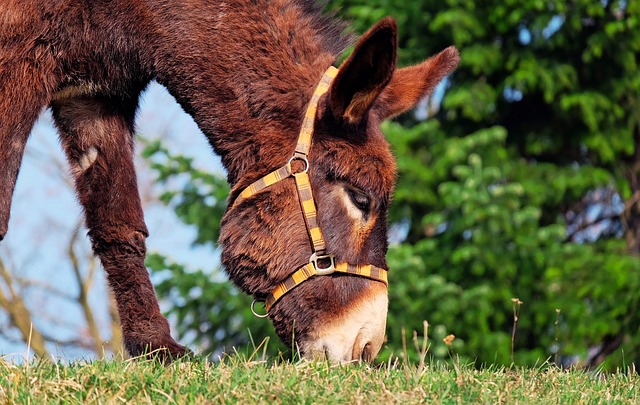In the Bible, the mule is often used as a symbol of stubbornness and disobedience. This symbolism can be seen in various passages throughout the Old and New Testaments, where mules are depicted as animals that are difficult to control and prone to rebellion. Despite this negative connotation, mules are also sometimes used to symbolize strength and endurance, as they are known for their ability to carry heavy loads over long distances. Ultimately, the biblical meaning of a mule can vary depending on the context in which it is mentioned, but it is generally associated with qualities such as stubbornness, disobedience, and strength.
Table of Contents
Mule Symbolism in the Bible
Have you ever come across the mention of a mule in the Bible and wondered what it symbolizes? Mules are not as commonly mentioned in the Bible as other animals like sheep or donkeys, but they do hold a significant symbolic meaning. In this article, we will explore the biblical symbolism of a mule and what it represents in the context of the scriptures.
In the Bible, a mule is often seen as a symbol of stubbornness and disobedience. This symbolism stems from the fact that a mule is a hybrid animal, the offspring of a horse and a donkey. In biblical times, mixing different kinds of animals was seen as going against God’s natural order, and thus, mules were considered impure and unnatural.
The stubborn nature of a mule is highlighted in various passages in the Bible. For example, in the book of Proverbs, it is written, “A whip for the horse, a bridle for the donkey, and a rod for the back of fools” (Proverbs 26:3). This verse suggests that just as a whip and a bridle are used to control a horse and a donkey, a rod is needed to discipline a fool, much like the stubbornness of a mule.
Despite their negative connotations, mules are also mentioned in a positive light in some instances in the Bible. For example, in the book of 1 Kings, King Solomon is said to have ridden on a mule during his coronation ceremony. This act symbolized his royal status and authority, as mules were often used by kings and nobles for transportation.
Another positive mention of mules in the Bible can be found in the book of Zechariah. In Zechariah 9:9, it is written, “Rejoice greatly, O daughter of Zion! Shout, Daughter of Jerusalem! See, your king comes to you, righteous and victorious, lowly and riding on a donkey, on a colt, the foal of a donkey.” This passage is often interpreted as a prophecy of Jesus’ triumphal entry into Jerusalem, riding on a donkey, which symbolizes humility and peace.
In conclusion, the biblical symbolism of a mule is complex and multifaceted. While mules are often associated with stubbornness and disobedience, they can also represent royalty, authority, and humility in certain contexts. As with many symbols in the Bible, the meaning of a mule can vary depending on the specific passage and interpretation. Next time you come across a mention of a mule in the scriptures, take a moment to reflect on its symbolic significance and how it adds depth to the biblical narrative.
The Significance of Mules in Biblical Stories
Mules are mentioned several times in the Bible, and their presence holds significant symbolism in various stories. In biblical times, mules were considered valuable animals, often used for transportation and labor. They were a crossbreed between a horse and a donkey, combining the strength and endurance of both animals. This unique combination made mules highly prized for their ability to carry heavy loads over long distances.
One of the most well-known stories involving a mule is found in the book of 2 Samuel. In this story, Absalom, the son of King David, rebels against his father and attempts to take the throne for himself. As Absalom and his followers flee from David’s army, Absalom rides on a mule. However, as he is riding through the forest, his long hair becomes entangled in the branches of a tree, leaving him vulnerable to attack. Absalom is eventually killed by David’s men, bringing an end to his rebellion.
The story of Absalom and the mule is often interpreted as a cautionary tale about the dangers of pride and rebellion. Absalom’s choice to ride a mule, a symbol of his own arrogance and defiance, ultimately leads to his downfall. The mule becomes a symbol of Absalom’s foolishness and the consequences of his actions.
In another biblical story, King Solomon is said to have ridden on a mule during his coronation ceremony. This event is significant because it fulfills a prophecy made by the prophet Nathan, who declared that Solomon would succeed David as king. By riding on a mule, Solomon is symbolically fulfilling this prophecy and establishing his authority as the new king of Israel.
The use of a mule in Solomon’s coronation also carries symbolic meaning. Mules were often associated with royalty and power in ancient times, as they were considered superior to other animals in terms of strength and endurance. By choosing to ride a mule, Solomon is emphasizing his status as a powerful and capable ruler.
Overall, the biblical symbolism of mules is complex and multifaceted. They can represent pride and rebellion, as seen in the story of Absalom, or they can symbolize royalty and power, as in the case of King Solomon. The choice to include mules in these stories adds depth and meaning to the narratives, highlighting the importance of these animals in biblical times.
In conclusion, the biblical meaning of a mule is rich with symbolism and significance. Whether representing pride, rebellion, or royalty, mules play a crucial role in shaping the narratives of the Bible. By understanding the symbolic importance of mules in biblical stories, we can gain a deeper appreciation for the messages and lessons contained within these ancient texts.
Biblical References to Mules and Their Meaning

Have you ever come across the mention of mules in the Bible and wondered what significance they hold in biblical symbolism? Mules are not as commonly mentioned as other animals in the Bible, but when they do appear, they carry a deeper meaning that can shed light on various aspects of our spiritual journey.
In biblical times, mules were often associated with strength, endurance, and stubbornness. They were considered valuable animals for their ability to carry heavy loads and travel long distances. In fact, mules were often used by kings and nobles as a symbol of power and wealth. This symbolism is reflected in the Bible, where mules are sometimes mentioned in the context of royalty and prosperity.
One of the most famous references to mules in the Bible can be found in the story of King David. In 1 Kings 1:33-40, we read about how David’s son, Solomon, is anointed as king and rides on David’s mule to his coronation. This act symbolizes the passing of the royal mantle from father to son and the continuity of the royal line. It also highlights the importance of mules as a symbol of kingship and authority.
Another significant mention of mules in the Bible can be found in the book of Zechariah. In Zechariah 9:9-10, we read about the prophecy of the coming of the Messiah, who is described as humble and riding on a donkey, on a colt, the foal of a donkey. This imagery of the Messiah riding on a donkey instead of a horse or a mule symbolizes his humility and peaceful nature. It also serves as a reminder that true power and authority come from God, not from earthly possessions or status symbols.
The symbolism of mules in the Bible is not limited to their association with royalty and authority. Mules are also mentioned in the context of stubbornness and disobedience. In the book of Proverbs, we read in Proverbs 26:3 that “A whip for the horse, a bridle for the donkey, and a rod for the backs of fools.” This verse highlights the stubborn and rebellious nature of mules and serves as a warning against pride and disobedience.
Despite their negative connotations, mules can also symbolize strength and resilience in the face of adversity. In the book of Job, we read in Job 39:19-25 about how God describes the strength and fearlessness of the mule, who is unafraid of battle and does not shy away from danger. This imagery of the mule as a fearless and steadfast creature reminds us of the importance of standing firm in our faith and trusting in God’s protection.
In conclusion, the biblical symbolism of mules is multifaceted and rich in meaning. From their association with royalty and authority to their symbolism of stubbornness and resilience, mules serve as powerful metaphors for various aspects of our spiritual journey. As we reflect on the significance of mules in the Bible, may we be inspired to embrace the qualities of strength, humility, and obedience in our own lives.
Understanding the Spiritual Meaning of Mules in the Bible
Have you ever come across the mention of mules in the Bible and wondered about their significance? Mules are not as commonly mentioned as other animals in the Bible, but when they do appear, they carry a deep spiritual meaning. Let’s delve into the biblical symbolism of mules and uncover the lessons they can teach us.
In the Bible, mules are often associated with strength and endurance. They are known for their ability to carry heavy loads and travel long distances without tiring easily. This characteristic of mules is often used to symbolize perseverance and resilience in the face of challenges. Just like a mule can carry a heavy burden without giving up, we are called to endure hardships and trials with steadfast faith.
One of the most famous mentions of mules in the Bible is in the story of King David. In 2 Samuel 13, Absalom, David’s son, rides on a mule as he leads a rebellion against his father. The mule symbolizes Absalom’s pride and rebellion against God’s appointed king. This story serves as a cautionary tale about the dangers of pride and disobedience.
Another significant mention of mules in the Bible is in the book of Zechariah. In Zechariah 9:9-10, the prophet foretells the coming of the Messiah, who will enter Jerusalem riding on a donkey, a colt, the foal of a donkey. This prophecy was fulfilled when Jesus entered Jerusalem on Palm Sunday, riding on a donkey. The use of a donkey instead of a horse or a mule symbolizes humility and peace. Jesus, the Prince of Peace, came not as a conquering king on a warhorse but as a humble servant on a donkey.
The symbolism of mules in the Bible extends beyond their physical characteristics. Mules are often used to represent the idea of being unequally yoked. In the Old Testament, the Israelites were forbidden from yoking together an ox and a donkey to plow a field (Deuteronomy 22:10). This command was meant to teach the Israelites about the importance of being in harmony with those who share their faith and values. Just as an ox and a donkey cannot work together effectively, believers are cautioned against forming close relationships with unbelievers who may lead them astray.
The biblical symbolism of mules reminds us of the importance of staying true to our faith and values, even when faced with challenges and temptations. Just as a mule carries its burden with strength and endurance, we are called to persevere in our faith journey and trust in God’s guidance. The story of King David and Absalom serves as a warning against pride and rebellion, while the prophecy of Jesus riding on a donkey reminds us of the importance of humility and peace.
As we reflect on the biblical meaning of mules, let us strive to embody the qualities of strength, endurance, humility, and faithfulness in our own lives. May we learn from the lessons that mules teach us and walk in the path of righteousness, guided by the light of God’s word.
The Symbolic Representation of Mules in Biblical Context
Mules are fascinating creatures that have been mentioned in the Bible in various contexts. While they may not be as prominent as other animals like lions or sheep, mules hold a significant symbolic meaning in biblical literature. Understanding the biblical symbolism of mules can provide insight into the deeper spiritual meanings behind these animals.
In the Bible, mules are often associated with strength and endurance. They are known for their ability to carry heavy loads and travel long distances without tiring easily. This physical strength is often seen as a symbol of resilience and perseverance in the face of challenges. Just as mules are able to bear heavy burdens, believers are encouraged to rely on God’s strength to carry them through difficult times.
Another important aspect of mules in the Bible is their hybrid nature. Mules are the offspring of a horse and a donkey, two different species that are not meant to reproduce together. This hybrid nature can be seen as a symbol of unity and harmony, as mules bring together the best qualities of both horses and donkeys. In a similar way, believers are called to embrace diversity and work together in unity to achieve common goals.
Mules are also mentioned in the Bible in the context of royalty and wealth. In ancient times, mules were often used as royal mounts and were considered a symbol of power and prestige. Kings and nobles would ride mules to demonstrate their wealth and status. This association with royalty can be seen as a reminder of the importance of humility and service, even in positions of authority.
One of the most famous stories involving mules in the Bible is the account of King David’s mule in 1 Kings 1:33-44. In this story, David’s son Adonijah tries to usurp the throne, but Solomon is anointed as king instead. Solomon is then placed on David’s mule and paraded through the streets of Jerusalem to proclaim his kingship. This event symbolizes the transfer of power and authority from one generation to the next, as well as the fulfillment of God’s promises to his people.
Overall, the biblical symbolism of mules is rich and multifaceted. These animals represent strength, unity, royalty, and humility, among other qualities. By studying the significance of mules in the Bible, believers can gain a deeper understanding of God’s plan for their lives and the world around them.
In conclusion, mules play an important role in biblical literature as symbols of strength, unity, and royalty. Their hybrid nature and ability to carry heavy burdens make them powerful metaphors for the challenges and triumphs of the human experience. By reflecting on the biblical meaning of mules, believers can find inspiration and guidance in their own spiritual journey.
Conclusion
In the Bible, a mule is often seen as a symbol of stubbornness and disobedience. It is also associated with wealth and royalty, as mules were often used by kings and wealthy individuals for transportation. Overall, the biblical meaning of a mule can vary depending on the context in which it is mentioned, but it is generally seen as a symbol of strength, stubbornness, and wealth.
For licensing reasons, we must provide the following notice: This content was created in part with the help of an AI.


